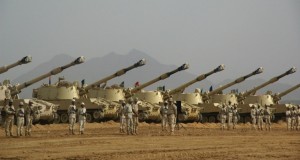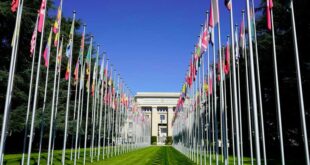The huge intensification of the military confrontation in Yemen dimmed the lights of the ongoing diplomatic activities aimed at reaching a political solution in Yemen. A deeper look at the situation there shows that there is still some way to go before a serious window for a political deal opens up even with the worsening humanitarian crisis.
Some efforts are done by the UN, Oman and others. Yet, appearance of progress is based on deceptive sign and overoptimistic statements. One of these deceptive signs was the hardly noticed Russian reversal of positions on the Security Council Resolution 2216. Last week, Moscow sent an official letter to the Yemeni government announcing its acceptance of the UNSC R2216.
Moscow abstained in the Security Council when the Resolution was voted last April. There are certain ideas circulating and possibly Moscow wants to play an active role in the diplomatic search for a way out of the crisis in the future. As the Resolution is understood to require reinstating the government of Khaled Bahah, the idea is to form a joint government, still headed by Bahah, but combines representatives of both the Houthis and of former President Ali Abdullah Saleh. In the current circumstances, this project does not stand a chance whatsoever.
But as is always the case, things change and some sort of compromise maybe reached. That has to wait however. Escalations of military action on the ground complicates any attempt to create the momentum, atmosphere and openness necessary for the required exchange of concessions. The Houthi and Saleh supporters hit a military camp where Coalition forces were stationed with a Tochka missile Sep 3 killing 45 soldiers from the UAE. The attack was followed by another assault on the borders with Saudi Arabia that led to the death of five Bahraini soldiers. Ten other Saudi soldiers were also killed. The anger that follows, which will remain for some time, does not allow to speak about compromises at the present moment.
The death of the UAE soldiers will have a certain political impact particularly on Abu Dhabi’s policy towards former President Saleh. The son of Saleh, Ahmed, who also was the ambassador of Yemen in the UAE, returned to Sanaa two days after the incident. He might have been told to leave the UAE immediately.
This tragic death of the UAE soldiers may be a trigger for Saleh to reconsider his position. Yet, officers in Saleh’s army said after the attack that major Saudi cities like Abha, Jeddah and Riyadh are “legitimate targets for our forces”. Saudi and Emirati air raids intensified following the September 3rd attack on the camp.
The effort of UN Envoy to Yemen Ismail Ould Cheikh Ahmed is focused on finding a practical mechanism to implement the SCR. The efforts of Ahmed are revolving around preserving the form of the previous political arrangements reached before the current crisis while changing its content to include new realities. This is why there is an intensive escalation now to alter these realities. Qatari forces, 1000 of them, joined the fight in the side of Saudi Arabia. Egypt is reported to be sending several thousands of its elite forces Cairo denied the reports later). Saudi Arabia sent 1000 of its soldiers to the same spot where their brethren were killed. As it stands, it is the military campaign, not the peace effort, that is gaining momentum.
The problems facing the UN envoy are multiple. It is difficult to hope for a halt in the escalation so long as Saudi Arabia deems it necessary to alter the situation on the ground. Major cities still under the control of Saleh and the Houthis are coming now under attack. It is also difficult to reach a cease fire as long as the military front lines remain entangled the way they are now. Furthermore, the incident of the Tochka missile and the killings of Saudis and Emirati soldiers made Ahmed’s job a mission impossible at least for the time being.
For example, there was ongoing speculations in relevant Yemeni circles that Abdul Majid Al Ariani, a seasoned Yemeni politician, is being consulted to take the position of the Prime Minister. Ariani is a talented negotiator with a record of success in navigating political differences and reaching acceptable compromises. Thinking of Ariani as a Prime Minister may have expressed a realization that a period of serious negotiations is approaching. Bahah, who is accepted regionally and internationally, will be promoted to become vice president. However, the consultations with Ariani were frozen abruptly. Winds were blowing in a different direction.
Certain unofficial statements hinted that there will be no negotiations before the pro-Hadi, GCC backed forces take Sanaa back. In other words, no negotiations before ending all reasons to negotiate. For if Hadi recaptures Sanaa, the other camp would have suffered substantial losses to the extent that talks would be meaningless. Any kind of symbolic reconciliation then would only aim at avoiding an internal insurgency.
 Geostrategic Media Political Commentary, Analysis, Security, Defense
Geostrategic Media Political Commentary, Analysis, Security, Defense





